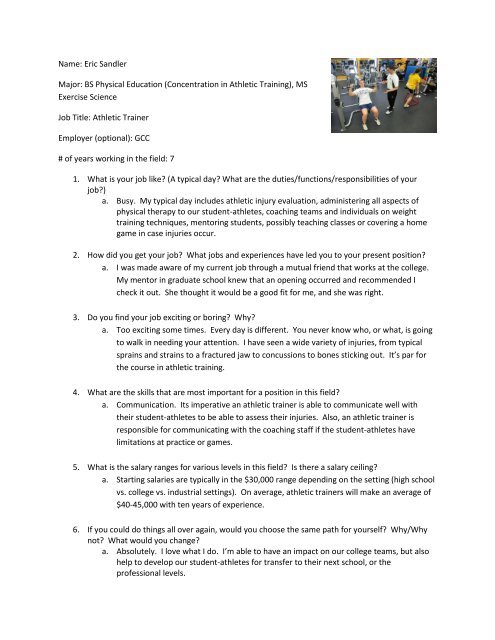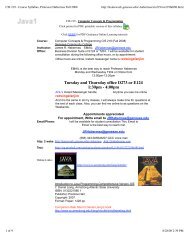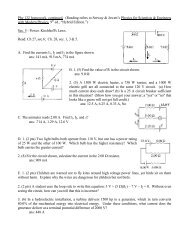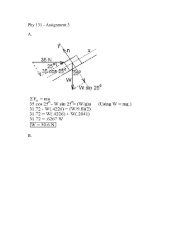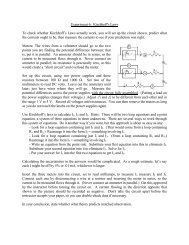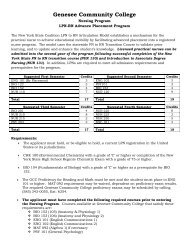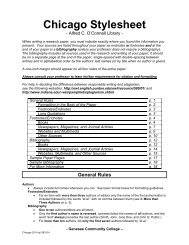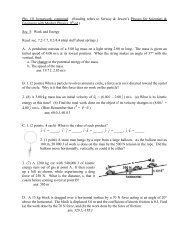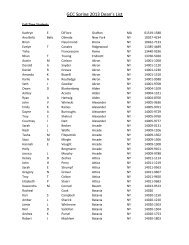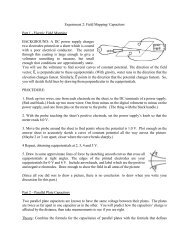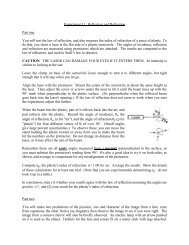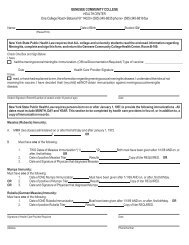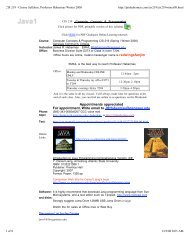Athletic Trainer - Genesee Community College
Athletic Trainer - Genesee Community College
Athletic Trainer - Genesee Community College
You also want an ePaper? Increase the reach of your titles
YUMPU automatically turns print PDFs into web optimized ePapers that Google loves.
Name: Eric Sandler<br />
Major: BS Physical Education (Concentration in <strong>Athletic</strong> Training), MS<br />
Exercise Science<br />
Job Title: <strong>Athletic</strong> <strong>Trainer</strong><br />
Employer (optional): GCC<br />
# of years working in the field: 7<br />
1. What is your job like? (A typical day? What are the duties/functions/responsibilities of your<br />
job?)<br />
a. Busy. My typical day includes athletic injury evaluation, administering all aspects of<br />
physical therapy to our student-athletes, coaching teams and individuals on weight<br />
training techniques, mentoring students, possibly teaching classes or covering a home<br />
game in case injuries occur.<br />
2. How did you get your job? What jobs and experiences have led you to your present position?<br />
a. I was made aware of my current job through a mutual friend that works at the college.<br />
My mentor in graduate school knew that an opening occurred and recommended I<br />
check it out. She thought it would be a good fit for me, and she was right.<br />
3. Do you find your job exciting or boring? Why?<br />
a. Too exciting some times. Every day is different. You never know who, or what, is going<br />
to walk in needing your attention. I have seen a wide variety of injuries, from typical<br />
sprains and strains to a fractured jaw to concussions to bones sticking out. It’s par for<br />
the course in athletic training.<br />
4. What are the skills that are most important for a position in this field?<br />
a. Communication. Its imperative an athletic trainer is able to communicate well with<br />
their student-athletes to be able to assess their injuries. Also, an athletic trainer is<br />
responsible for communicating with the coaching staff if the student-athletes have<br />
limitations at practice or games.<br />
5. What is the salary ranges for various levels in this field? Is there a salary ceiling?<br />
a. Starting salaries are typically in the $30,000 range depending on the setting (high school<br />
vs. college vs. industrial settings). On average, athletic trainers will make an average of<br />
$40-45,000 with ten years of experience.<br />
6. If you could do things all over again, would you choose the same path for yourself? Why/Why<br />
not? What would you change?<br />
a. Absolutely. I love what I do. I’m able to have an impact on our college teams, but also<br />
help to develop our student-athletes for transfer to their next school, or the<br />
professional levels.
7. How well did your college experience prepare you for this job? What courses have proved to be<br />
the most valuable to you in your work?<br />
a. In athletic training, you accumulate about 1000-1500 hours of supervised work<br />
experience as part of the educational process. These clinical experiences are vitally<br />
important to the development of the skills of student athletic trainers. I particularly<br />
liked the exercise physiology and therapeutic exercise classes in college.<br />
8. How important are grades/GPA for obtaining a job in this field?<br />
a. Certification is more important than grades. However, acquiring that certification is not<br />
easy and the national pass rate is currently under 50% for first time takers.<br />
9. What are the typical entry-level job titles and functions? What entry-level jobs are best for<br />
learning as much as possible?<br />
a. There are two ways one would typically enter the profession. The first is as a Graduate<br />
Assistant <strong>Athletic</strong> <strong>Trainer</strong>. These jobs involve working for a college athletic department<br />
part time while attending graduate school. Many of these schools will include a tuition<br />
waiver as part of their compensation package. The other route for entry into the field is<br />
as a high school athletic trainer. This gives the newly certified athletic trainer an<br />
opportunity to gain real work experience on their own right away.<br />
10. What special advice do you have for a student seeking a position in this field?<br />
a. Intern, intern, intern. Meet as many professionals as possible to network with. It may<br />
lead to a job opportunity someday. In this field, there are so many ways to treat each<br />
injury and everyone does things just slightly differently. The more educational<br />
opportunities you have to observe and work with others in various settings, the better.


